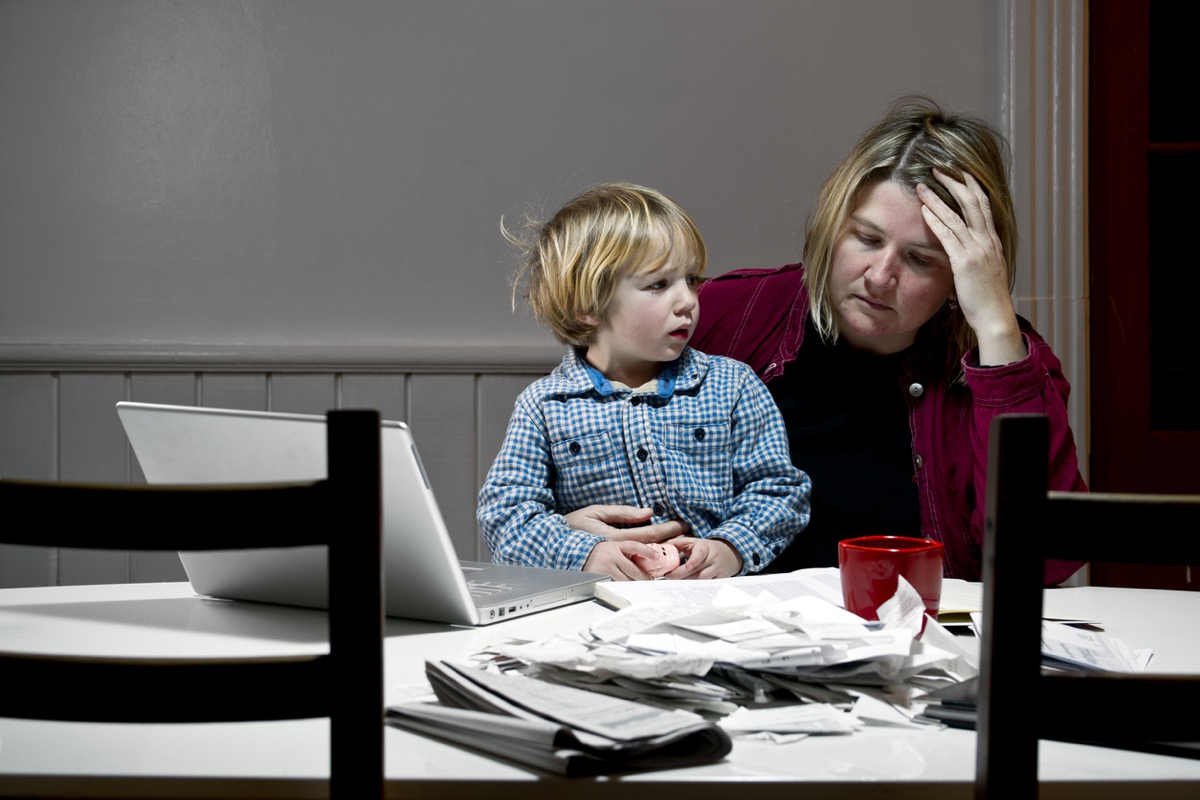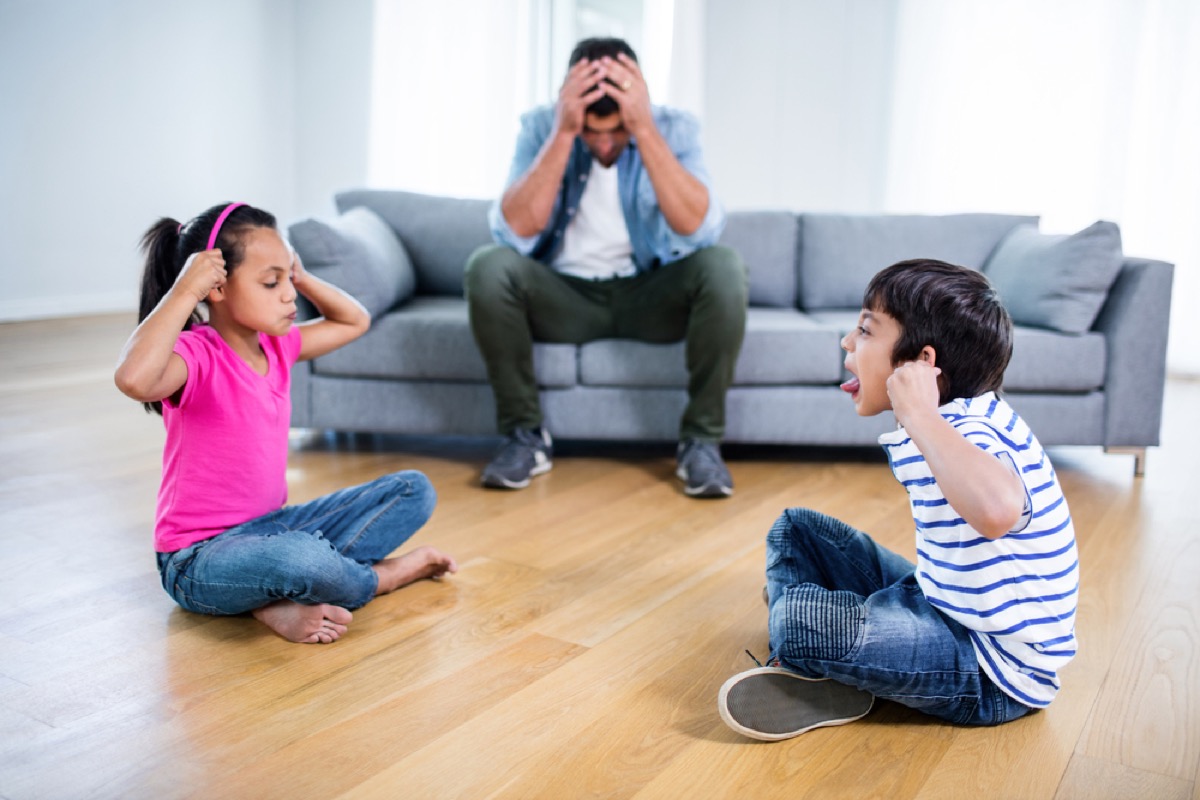16 Ways Experts Say Parents Ruin Their Relationships With Their Kids

When it comes to kids, there’s only one constant: change. And that’s not just applicable to their likes and dislikes, but to our ever-evolving relationships with them as parents, too. Maybe you’ve stopped eating dinner together as a family. Perhaps it’s gotten harder to move on after an argument, or, rather than letting them try and fail, you’ve gotten used to intervening when things get rough. If any of these situations sound familiar to you, it’s time to take a step back and work on your parent-child relationship before things take a turn for the worse. Here’s how mental health experts say you could be ruining your relationship with your kids without realizing it.
1
You don’t talk to your children about your feelings.

Being able to name and process your feelings is a learned skill, one that kids typically develop at home. And parents can model how to “name to tame” feelings by doing it for themselves in plain view of their children, explains New York-based child psychotherapist Lucía García-Giurgiu.
While you should of course be careful not to dump grown-up problems on kids before they’re ready for such burdens, sharing your own difficult moments in an age-appropriate way will only strengthen your bond, humanize you in their eyes, and show them how to safely process their own negative feelings as they come up.
2
Or you let your mood affect your interactions with them.

When you’ve had a rough day at work or you’re feeling exhausted, it might feel a bit phony to slap on a smile and greet your child with exuberance. But kids are sensitive to their parents’ emotions, especially the negative ones. If you frequently interact with your child with a chip on your shoulder, you might be damaging the relationship. California-based family counselor Amanda Lopez suggests asking yourself, “How do you act when your child walks into a room? Are you happy to see them? Do you ignore them?” If the answer to that last question is “yes,” it’s time to fake it ’til you make it.
“Sometimes a smile or a delighted look can change the nature of an interaction. Children want to be acknowledged and appreciated, just like everyone else,” Lopez explains. If you’re having a tougher day, make it a point to carve out a few minutes for yourself to sit with those feelings, then set them aside so you can try to make the most of your time spent with your children.
3
You mismanage your child’s tantrums.

Tantrums are common in younger children, and many parents find them to be a particularly frustrating part of child rearing. But, according to Lopez, frequent tantrums can indicate that a child feels unheard, and disconnected from their parents.
“Try mirroring your child’s emotions and putting them into words,” she suggests. “For instance, ‘You’re feeling frustrated right now because you don’t want to go to bed!’ Then offer a correction: ‘It’s OK to feel frustrated when we have to do something we don’t want to do, but right now it is time to go to bed.’ Validating and providing an alternative helps kids to learn how to self-soothe, and will in turn reduce their need to act out.”
4
You don’t get enough quality time together.

When it comes to parenting, spending quality time with your child is paramount. It’s a chance to form a deep bond, impart your system of values, share important life lessons, and set a foundation for a long-lasting, healthy parent-child relationship. And, as long as you’re active about it, “quality time” as a family can be anything: going to the park, practicing a sport, playing a board game, reading together, or even just talking about your day. The key is staying present and attentive when you’re together. “You may be sitting next to your child, but if your attention is somewhere else, your child is missing you,” Lopez explains.
5
Or your time together is spent on devices.

In today’s day and age, it’s all too easy to rely on screens as a stand-in babysitter, but therapists agree that parents should resist the temptation. “If you and your kids are being entertained by information on your electronic devices more than you’re entertaining each other in real life, there may be something bigger at play here,” says Heidi McBain, LMFT, who’s based in Flower Mound, Texas. “Start with setting boundaries and limits around electronic use for all members of your family, and then start coming up with small ways that you can reconnect with one another, such as baking something sweet together, going for a walk together, or going out to eat and talking about life.”
6
And you rarely eat meals together.

Neglecting to sit down for family meals could be a sign that your relationship with your kids needs a little TLC. “Family meals are an important routine for fostering parent-child relationships, communication skills, and healthy eating habits,” says Nicole Beurkens, PhD, a holistic clinical psychologist based in Caledonia, Michigan. “If you can’t recall the last time you intentionally sat down together for a meal, or you aren’t doing it regularly throughout the week, then getting into a regular routine of family mealtimes is a simple and powerful way to improve the relationship you have with your children.”
7
You don’t often celebrate your child’s strengths.

A parent’s validation is a huge source of confidence and pride for a child, and vocally rooting for your child’s successes strengthens your bond as a family. According to Mayra Mendez, PhD, LMFT, a psychotherapist based in Santa Monica, California, parents should always seek the good in their children, and point out what their child does well. “Catch your child ‘being good.’ This requires refocusing your attention on the positive things they do, no matter how small,” she says.
Worried that all of that praise and validation will go to their heads? Focus on praising the process rather than the end result by complimenting their hard work, persistence, or bravery.
8
You spend a lot of time correcting their actions.

Boundaries are important for kids. After all, it’s through the rules of your family and household that they learn how to exist in the world. But there is such a thing as over-correcting your child, and doing so can leave them feeling like nothing they do will please you. Mendez explains that if you consistently “focus on what you believe your child is doing wrong”—especially if you’re always “identifying and demanding correction of those wrongs”—that can damage your relationship with your kids and undermine trust.
If you sense you’re going overboard, pick your battles and enforce the rules that your family believes in most strongly. According to Mendez, you shouldn’t dig in your heels over age-appropriate habits, like whether or not your eight-year-old makes their bed.
9
And you don’t give them the benefit of the doubt.

Kids make a lot of mistakes; it’s part of growing up. But if you default to perceiving their actions as intentional, Mendez argues that you could create a cycle of resentment and alienation that will ultimately put distance and distrust between you.
Instead, she says, “catch negative thoughts and negative projections you have about your child, and question if there is truth to those judgements. Make a conscious effort to change those thoughts and replace them with more positive ones, such as saying to yourself that your child did not mean harm, that accidents happen, and the child was doing the best they could, given their developmental capacity.”
Remind your child that, while you don’t like those particular actions, you still like them as people. Then, be specific about how they can change their actions next time so that the problem doesn’t repeat itself.
10
You don’t know much about your child’s interests.

If someone were to ask you about your child’s interests, favorite pastimes, and classmates, are you confident that you’d know how to answer? If not, this may be a sign that you’re not spending enough quality time with your child, or that you’re not listening closely enough when they talk to you.
The minutiae of your child’s day-to-day life—whether they enjoyed a class at school, or made up with a friend after a small argument—may read in the moment as trivial, but that couldn’t be further from the truth to your child. “Ask them about their day and actively listen when they talk to you,” says Mendez. “Be curious, and show genuine excitement and interest when they share.”
11
And you don’t know their friends.

As your kids get older, their friendships will become increasingly central to their lives. Knowing your child’s friends bridges the gap between your family and their new world outside of your home, and acknowledges their need for peer connection—something that will go a long way as they enter their teen years.
It also gives you a crucial window of insight into the people who are helping to shape your child’s identity; their friends’ habits and values will undoubtedly contribute to those of your child. If who they spend their time with is a big question mark, getting to know their friends should be at the top of your relationship-improvement checklist.
12
You avoid talking to your kids about difficult topics.

Your kids are dealing with all sorts of complex emotions every day, and if you’re not talking about the challenges they’re facing, they only have their peers and their gut to guide them (and you can guess how that often turns out).
Instead of making topics like sex or drugs too taboo to talk about, acknowledge that they exist and give your child the tools they need to make responsible, safe choices. “Children are very perceptive and can pick up nonverbal cues around their parents’ feelings of discomfort,” says Gita Zarnegar, PhD, a licensed therapist and co-founder of The Center for Authenticity. Chances are your lack of communication is speaking volumes, and it’s sending the wrong message.
13
You do everything for your child.

Parents these days tend to default to doing things for their child that they could very well do for themselves with some effort. And in doing so, they’re likely holding their children back from reaching their full potential. “When you do everything for your child, you are depriving them from having an authentic experience of who they are and what their strengths entail,” says Zarnegar.
She warns that, as your child loses touch with their own experiences, they lose their resiliency and become unclear on which areas in their lives are in need of improvement. “Children will begin to gradually develop a diminished sense of themselves and their capacities,” she explains.
14
You don’t let them fail.

Similarly, when you shield your kids from failure and disappointment, you likely pass your own fear of failure down to them, which will send them the message that their best just isn’t good enough and train them into risk-averse behavior, Zarnegar explains.
“When you don’t allow your children to fail, you are communicating that failure is unacceptable and shameful,” she says. “Ultimately, living with the fear of failure leads to decreased experiences of vitality and expansivity.” If you’ve been holding your kid back, it’s time to work on that element of your parent-child relationship before they take a major hit to their confidence.
15
You’re impatient with your child’s negative emotions.

Kids are emotional roller coasters, and as parents, we don’t get to cherry-pick the positive emotions and ignore the rest. If you find that you’re impatient when your child is upset or angry, and are eager to fast-forward to the part where they’re happy as clams, this may be an area of improvement in your parent-child relationship.
Tania DaSilva, a Toronto-based child and youth therapist, argues that slowing down and encouraging your kids to take the time they need to experience and process their feelings gives them the tools they’ll need to become emotionally intelligent and healthy later in life. “As parents we usually want to save our children from uncomfortable feelings and experiences, but this does not lead to resilient children,” she explains. “Let your children problem solve for themselves and get comfortable being uncomfortable from time to time.”
16
And you struggle to move on after conflicts with your kids.

Of course it’s normal for kids and their parents to argue. From a young age, children struggle to assert their independence, and parents are in the precarious position of making sure they do that within safe, healthy boundaries. But if your conflicts linger with your kids, it may mean that something deeper is awry in the parent-child relationship, typically a problem of poor communication or a lack of trust—both of which can build ongoing resentment over time.
However defeating this may feel in the moment, keep in mind that we can learn from our failures—even when we’re failing each other. “Failure means we’re trying, we’re learning, and we’re growing,” says DaSilva. “Let’s ask ourselves, ‘What can we learn from this, and how can we move forward?’” Try voicing those questions out loud with your child’s participation, and see if you can take things in a constructive new direction.